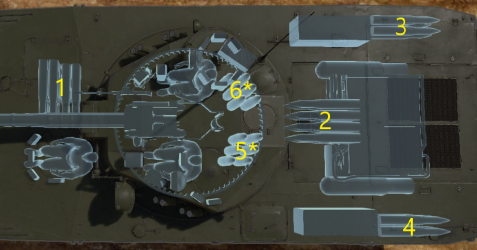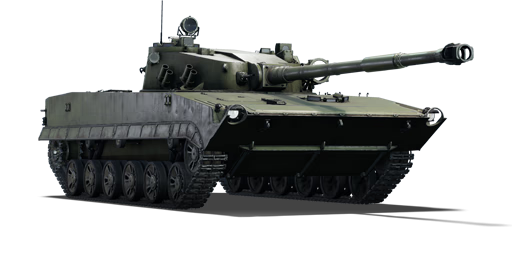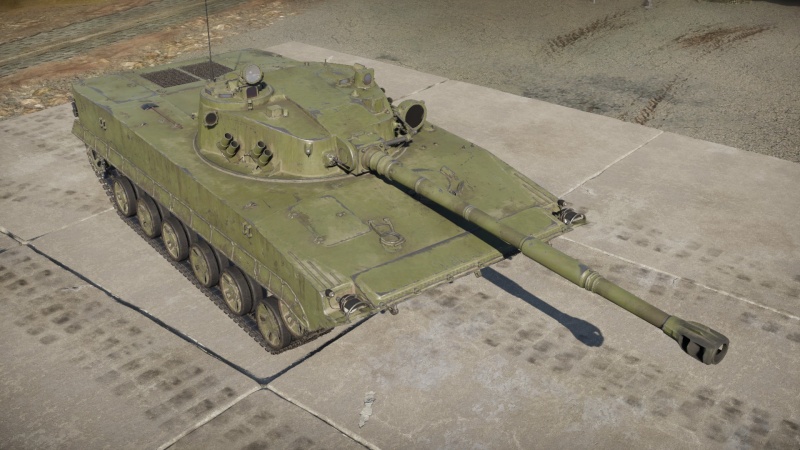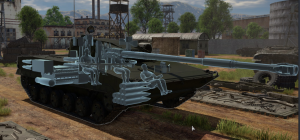Difference between revisions of "Object 685"
m (→Mobility) (Tag: Visual edit) |
(→Main armament: it has autoloader, table can be simplified) |
||
| (5 intermediate revisions by 3 users not shown) | |||
| Line 6: | Line 6: | ||
== Description == | == Description == | ||
<!-- ''In the description, the first part should be about the history of the creation and combat usage of the vehicle, as well as its key features. In the second part, tell the reader about the ground vehicle in the game. Insert a screenshot of the vehicle, so that if the novice player does not remember the vehicle by name, he will immediately understand what kind of vehicle the article is talking about.'' --> | <!-- ''In the description, the first part should be about the history of the creation and combat usage of the vehicle, as well as its key features. In the second part, tell the reader about the ground vehicle in the game. Insert a screenshot of the vehicle, so that if the novice player does not remember the vehicle by name, he will immediately understand what kind of vehicle the article is talking about.'' --> | ||
| − | The '''{{Specs|name}}''' | + | The '''{{Specs|name}}''' was a proposed replacement for the PT-76. It competed with two other designs, namely Object 788 and Object 934. The project's notable requirements were to develop a vehicle with a maximum combat weight of 15 tons, armed with a rifled 100-mm gun, an 9K111 "Fagot" anti-tank missile system, and a 12.7 mm machine gun. The project's protection requirements included anti-nuclear features like automatic sealing and air filtration capabilities, and the ability to withstand up to 23 mm AP rounds. Object 788 was disqualified for not including the 9K111 "Fagot" anti-tank missile system, trench-digging equipment, and a water-jet propulsion system. However, both Object 934 and {{Specs|name}} managed to pass the initial design evaluation, suggesting that they showed promise despite lacking certain components. It is likely that these designs were later taken into consideration for modifications and improvements to incorporate the missing criteria. Nevertheless, the production was eventually abandoned because they were unable to garner enough interest to continue. Still, later Soviet AFV designs made extensive use of many of the components and design solutions found in Object 934 and {{Specs|name}}, showing that their potential was recognized and put to good use. |
| + | |||
| + | The {{Specs|name}} was introduced in [[Update 1.91 "Night Vision"]]. It is a powerful and versatile vehicle that is well-suited for flanking. It features excellent forward mobility, a 6-second reload cannon, and a sufficient 3BM25 shell. However, its main drawbacks are its subpar survivability, lack of thermal sights, and poor gun depression. Even despite that, the {{Specs|name}} remains a good choice for players who prefer a more careful yet aggressive and fast-paced playstyle. | ||
== General info == | == General info == | ||
| Line 40: | Line 42: | ||
{{tankMobility|abMinHp=705|rbMinHp=402}} | {{tankMobility|abMinHp=705|rbMinHp=402}} | ||
| − | Mobility wise, the Object 685 can be considered as a slightly | + | Mobility wise, the Object 685 can be considered as a slightly heavier [[Object 906]] compensated by a noticeable stronger engine and a different gear box (note the missing reverse gearbox). It is not slow but is not the fastest light tank at the battle-rating. When downtiered, it is able to be faster than most tracked vehicles (most of them reach as most 65 km/h while this can reach more than 70 km/h) with exception of the [[Rooikat 105]], [[Rooikat Mk.1D]] and [[Radkampfwagen 90]]. It's suspension is a relatively soft suspension, meaning it will not damp as much in rough terrain but due to its thin tracks, the surface the tracks have on the floor make it be relatively slow on snow and sand (but faster than many tracked vehicles). It is fully amphibious which makes the Object 685 capable of crossing water bodies which can give an advantage (Eastern Europe river for example) but the speed while on water is lacklustre. |
=== Modifications and economy === | === Modifications and economy === | ||
| Line 62: | Line 64: | ||
! Mode !! Capacity !! Vertical !! Horizontal !! Stabilizer | ! Mode !! Capacity !! Vertical !! Horizontal !! Stabilizer | ||
! Stock !! Upgraded !! Full !! Expert !! Aced | ! Stock !! Upgraded !! Full !! Expert !! Aced | ||
| − | ! | + | !Autoloader |
|- | |- | ||
! ''Arcade'' | ! ''Arcade'' | ||
| − | | rowspan="2" | 40 || rowspan="2" | -4°/+17° || rowspan="2" | ±180° || rowspan="2" | Two-plane || 19.0 || 26.4 || 32.0 || 35.4 || 37.7 | + | | rowspan="2" | 40 || rowspan="2" | -4°/+17° || rowspan="2" | ±180° || rowspan="2" | Two-plane || 19.0 || 26.4 || 32.0 || 35.4 || 37.7 || rowspan="2" | 6.00 |
|- | |- | ||
! ''Realistic'' | ! ''Realistic'' | ||
| Line 73: | Line 75: | ||
==== Ammunition ==== | ==== Ammunition ==== | ||
| − | { | + | {{:2A48 (100 mm)/Ammunition|3BK17M, 3D3, BR-412D, 3BM25, OF-412}} |
| − | |||
| − | |||
| − | |||
| − | |||
| − | |||
| − | |||
| − | |||
| − | |||
| − | |||
| − | |||
| − | |||
| − | |||
| − | |||
| − | |||
| − | |||
| − | |||
| − | |||
| − | |||
| − | |||
| − | |||
| − | |||
| − | |||
| − | |||
| − | |||
| − | |||
| − | |||
| − | |||
| − | |||
| − | |||
| − | |||
| − | |||
| − | | 3BK17M | ||
| − | |||
| − | |||
| − | |||
| − | |||
| − | |||
| − | |||
| − | |||
| − | |||
| − | |||
| − | |||
| − | |||
| − | |||
| − | |||
| − | |||
| − | |||
| − | |||
| − | |||
| − | |||
| − | |||
| − | |||
| − | |||
| − | |||
==== [[Ammo racks]] ==== | ==== [[Ammo racks]] ==== | ||
Latest revision as of 12:27, 6 January 2024
Contents
Description
The Object 685 was a proposed replacement for the PT-76. It competed with two other designs, namely Object 788 and Object 934. The project's notable requirements were to develop a vehicle with a maximum combat weight of 15 tons, armed with a rifled 100-mm gun, an 9K111 "Fagot" anti-tank missile system, and a 12.7 mm machine gun. The project's protection requirements included anti-nuclear features like automatic sealing and air filtration capabilities, and the ability to withstand up to 23 mm AP rounds. Object 788 was disqualified for not including the 9K111 "Fagot" anti-tank missile system, trench-digging equipment, and a water-jet propulsion system. However, both Object 934 and Object 685 managed to pass the initial design evaluation, suggesting that they showed promise despite lacking certain components. It is likely that these designs were later taken into consideration for modifications and improvements to incorporate the missing criteria. Nevertheless, the production was eventually abandoned because they were unable to garner enough interest to continue. Still, later Soviet AFV designs made extensive use of many of the components and design solutions found in Object 934 and Object 685, showing that their potential was recognized and put to good use.
The Object 685 was introduced in Update 1.91 "Night Vision". It is a powerful and versatile vehicle that is well-suited for flanking. It features excellent forward mobility, a 6-second reload cannon, and a sufficient 3BM25 shell. However, its main drawbacks are its subpar survivability, lack of thermal sights, and poor gun depression. Even despite that, the Object 685 remains a good choice for players who prefer a more careful yet aggressive and fast-paced playstyle.
General info
Survivability and armour
Armour type:
- Alloy ABT-101 (hull, turret, cupola)
| Armour | Front (Slope angle) | Sides | Rear | Roof |
|---|---|---|---|---|
| Hull | 54 mm | 16 mm | 5 mm | 6 mm |
| Turret | 19 mm | 16 mm | 16 mm | 8 mm |
Notes:
- Suspension wheels are 10 mm thick and tracks are 20 mm thick
- The armour on the Object 685 is Alloy ABT-101. The armour values in the chart are displayed in rolled homogeneous armour equivalence.
The Object 685 is a very lightly armoured vehicle. The alloy may at first appear to be somewhat thick, but it is much less effective than rolled homogeneous armour at stopping rounds. The Object 685 can be killed by almost anything, with .50 calibre machine guns able to penetrate even parts of the front armour at close range. Additionally, the Object 685 is vulnerable to overpressure damage. The commander and gunner are somewhat far apart, but the Object has only 3 crew, so survivability is not particularly impressive. Generally, Object 685 drivers should not rely on their armour in any situation.
Mobility
| Game Mode | Max Speed (km/h) | Weight (tons) | Engine power (horsepower) | Power-to-weight ratio (hp/ton) | |||
|---|---|---|---|---|---|---|---|
| Forward | Reverse | Stock | Upgraded | Stock | Upgraded | ||
| Arcade | 79 | 23 | 16.5 | 705 | 868 | 42.73 | 52.61 |
| Realistic | 71 | 21 | 402 | 455 | 24.36 | 27.58 | |
Mobility wise, the Object 685 can be considered as a slightly heavier Object 906 compensated by a noticeable stronger engine and a different gear box (note the missing reverse gearbox). It is not slow but is not the fastest light tank at the battle-rating. When downtiered, it is able to be faster than most tracked vehicles (most of them reach as most 65 km/h while this can reach more than 70 km/h) with exception of the Rooikat 105, Rooikat Mk.1D and Radkampfwagen 90. It's suspension is a relatively soft suspension, meaning it will not damp as much in rough terrain but due to its thin tracks, the surface the tracks have on the floor make it be relatively slow on snow and sand (but faster than many tracked vehicles). It is fully amphibious which makes the Object 685 capable of crossing water bodies which can give an advantage (Eastern Europe river for example) but the speed while on water is lacklustre.
Modifications and economy
Armaments
Main armament
The Object 685 has the same ballistics as the D-10T2S 100 mm cannon even sharing the same ammunition. Thus, the use of the gun should be the same as the T-55A. The gun is capable of destroying all enemy vehicles it faces from the front (with exception of the Maus glacis) with its powerful APFSDS shell. Despite not having the most powerful dart at the battle rating, the 6 second reload of the autoloader makes the Object 685 a formidable quick firing tank, capable of destroying multiple enemies with relative speed.
Important: in order to let the autoloader load, the gunner must be alive
| 100 mm 2A48 | Turret rotation speed (°/s) | Reloading rate (seconds) | |||||||||||
|---|---|---|---|---|---|---|---|---|---|---|---|---|---|
| Mode | Capacity | Vertical | Horizontal | Stabilizer | Stock | Upgraded | Full | Expert | Aced | Autoloader | |||
| Arcade | 40 | -4°/+17° | ±180° | Two-plane | 19.0 | 26.4 | 32.0 | 35.4 | 37.7 | 6.00 | |||
| Realistic | 11.9 | 14.0 | 17.0 | 18.8 | 20.0 | ||||||||
Ammunition
| Penetration statistics | |||||||
|---|---|---|---|---|---|---|---|
| Ammunition | Type of warhead |
Penetration @ 0° Angle of Attack (mm) | |||||
| 10 m | 100 m | 500 m | 1,000 m | 1,500 m | 2,000 m | ||
| 3BK17M | HEATFS | 390 | 390 | 390 | 390 | 390 | 390 |
| BR-412D | APCBC | 239 | 236 | 220 | 202 | 185 | 170 |
| 3BM25 | APFSDS | 335 | 330 | 307 | 290 | 275 | 260 |
| OF-412 | HE | 27 | 27 | 26 | 24 | 23 | 21 |
| Shell details | ||||||||||||
|---|---|---|---|---|---|---|---|---|---|---|---|---|
| Ammunition | Type of warhead |
Velocity (m/s) |
Projectile mass (kg) |
Fuse delay (m) |
Fuse sensitivity (mm) |
Explosive mass (TNT equivalent) (g) |
Ricochet | |||||
| 0% | 50% | 100% | ||||||||||
| 3BK17M | HEATFS | 1,085 | 9.96 | 0.05 | 0.1 | 1,170 | 65° | 72° | 77° | |||
| BR-412D | APCBC | 887 | 15.88 | 1.2 | 19 | 100.1 | 48° | 63° | 71° | |||
| 3BM25 | APFSDS | 1,430 | 3.4 | - | - | - | 76° | 77° | 80° | |||
| OF-412 | HE | 900 | 15.6 | 0.2 | 0.1 | 1,460 | 79° | 80° | 81° | |||
| Smoke shell characteristics | ||||||
|---|---|---|---|---|---|---|
| Ammunition | Velocity (m/s) |
Projectile mass (kg) |
Screen radius (m) |
Screen deploy time (s) |
Screen hold time (s) |
Explosive mass (TNT equivalent) (g) |
| 3D3 | 880 | 15.6 | 16 | 5 | 25 | 50 |
Ammo racks

| Full ammo |
1st rack empty |
2nd rack empty |
3rd rack empty |
4th rack empty |
5th rack empty |
6th rack empty |
Visual discrepancy |
|---|---|---|---|---|---|---|---|
| 40 | 29 (+11) | 21 (+19) | 17 (+23) | 13 (+27) | 7 (+33) | 1 (+39) | No |
Note:
- Racks 5 and 6 are first-stage ammo racks
Machine guns
| 7.62 mm SGMT | ||||
|---|---|---|---|---|
| Mount | Capacity (Belt) | Fire rate | Vertical | Horizontal |
| Coaxial | 2,000 (250) | 600 | N/A | N/A |
Usage in battles
Gameplay Stock:
The Object 685 is much less powerful when stock. It is equipped with the 3BK17M HEAT-FS shell, which is generally inferior to the 3BM25 shell. Another issue while stock is the mobility, which is not as impressive when stock. Another issue is the lack of the Airstrike modification, which makes spawning in air vehicles easier in ground RB after scouting.
Gameplay Spaded:
The Object 685 is a highly mobile Soviet light tank which has an excellent cannon. Its disadvantages are thin armour and a lack of thermal sights. Object 685 players should avoid areas with heavy foliage, as the lack of thermals will prove detrimental in these areas. The best strategy with the Object 685 is flanking the enemy team using the Object 685's mobility. The amphibious capability can help create new avenues of attack when flanking. The scouting ability also helps the team while on the flanks. One tactic to avoid in the Object 685 is using the ESS system, as enemy thermal sights can see through the smoke, while the Object 685 will effectively blind itself.
Close Range Engagements:
The Object 685 can fare well at close range due to the excellent gun handling and reload rate. Additionally, the mobility of the vehicle allows it to easily outmanoeuvre enemies at close range.
Long Range Engagements:
The Object 685 may have difficulty in prolonged long range engagements. The main armament is excellent, but the Object is held back by its lack of thermal sights and low survivability. The lack of thermals means that seeing your target may be difficult at long range. Additionally, the low survivability means that the Object 685 will not survive most hits, even at long range.
Pros and cons
Pros:
- Powerful rounds with a fast reload
- Able to reload while putting out fires or replacing turret crew thanks to the autoloader
- Has smoke grenades and ESS
- Good mobility
- Scouting ability
- Thin armour avoids excessive spalling
- Amphibious
Cons:
- Thin armour
- Poor gun depression and elevation
- Vulnerable to overpressure
- Lack of thermal sights
- Small crew
History
After production of the PT-76 was discontinued, Soviet engineers began work on developing a suitable replacement around a set of requirements provided by the military. The requirements were sent to three different design bureaus, with each bureau developing its own vehicle around the given specifications.
One of the proposed designs, the Object 788, was disqualified early from the competition due to being incomplete and missing several key features mandated by the requirements. The other two designs, the Object 685 and Object 934 were both deemed as sufficient, and work on them continued. By the mid 1970s, both vehicles were built and tested, but neither managed to garner enough interest to warrant a production order being issued. Despite not making it past the prototype stage, design solutions from both vehicles were later applied to other Soviet fighting vehicles.
- From Devblog
In the 1970s, the Russian Ministry of Defense opted to create a replacement for the PT-76, the main to contestants being the PT-85 (also known as Object 906) and the Object 685. It was tested but did not enter service or combat. It featured components that were later used for multiple vehicles, this being the Object 688 (which ended being the BMP-2), BMD-3 and 2S25 Sprut-SD (based on BMD-3). It was made for airborne units to maintain the armoured section of airborne units, at the time those being PT-76, BMD-1 and ASU-85. It featured a greater weight than the PT-76 due to the size and main gun but featured a more compact suspension due to being a telescopic hydraulic shock absorbers and suspension.
Media
- Skins
See also
Links to the articles on the War Thunder Wiki that you think will be useful for the reader, for example:
- reference to the series of the vehicles;
- links to approximate analogues of other nations and research trees.
External links
| USSR light tanks | |
|---|---|
| T-26 | T-26 · T-26 (1st Gv.T.Br.) · T-26-4 · T-26E |
| BT | BT-5 · RBT-5 · BT-7 · BT-7 TD · BT-7M · BT-7A (F-32) |
| T-50 | T-126 · T-50 |
| T-70 | T-70 · T-80 |
| PT-76 | PT-76B · PT-76-57 · Object 906 |
| BMP | BMP-1 · BMP-2 · BMP-2M · BMP-3 |
| BMD | BMD-4 |
| 2S25 | 2S25 · 2S25M |
| Wheeled | BA-11 · BTR-80A |
| Other | T-60 · Object 685 · 2S38 |
| China | ▂Type 62 |






